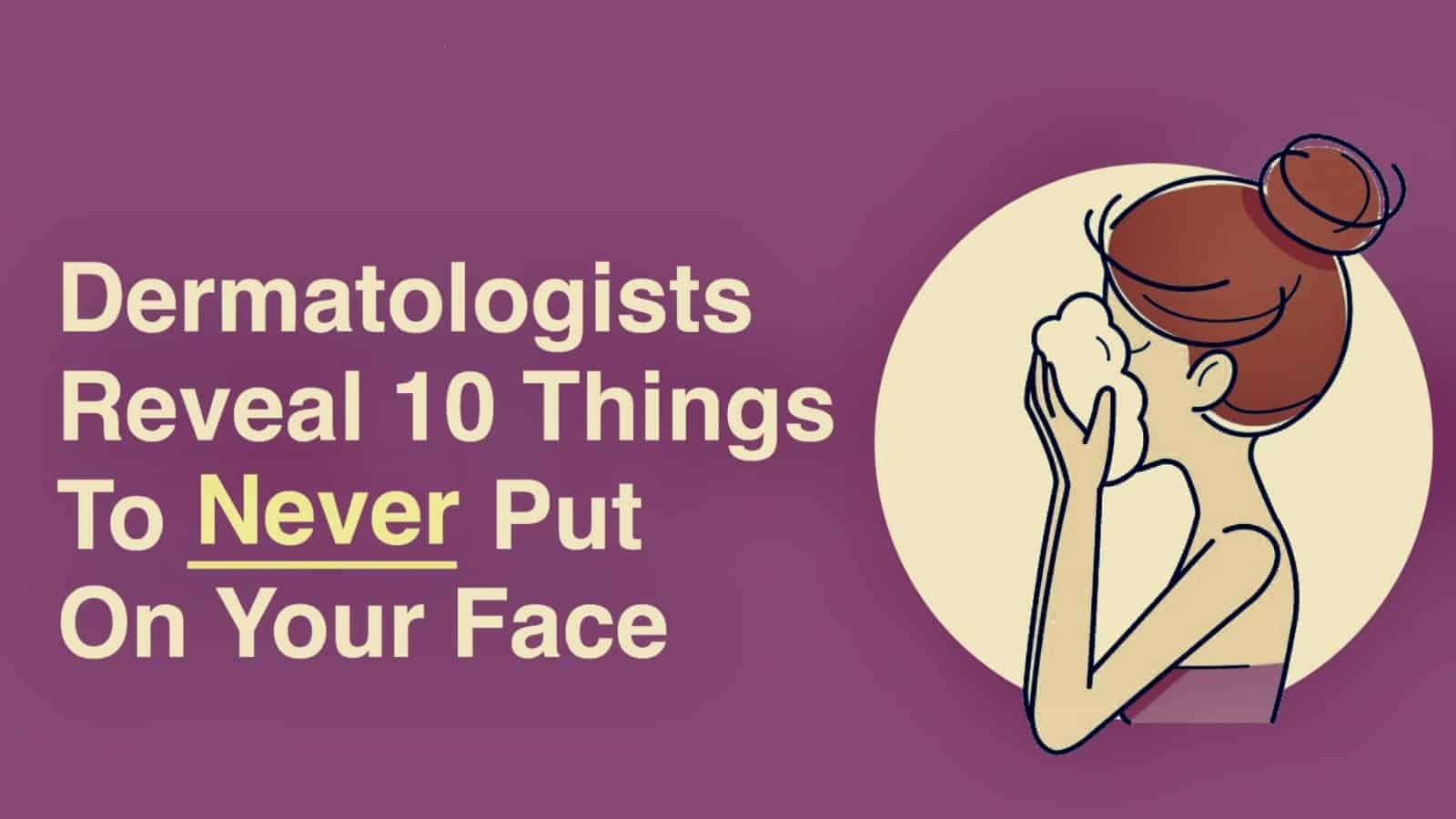Did you know that the cosmetic industry is highly unregulated? The Food and Drug Administration (FDA) does not require skincare products to be approved before becoming available on the consumer market.
You read that correctly. Apparently, the regulatory agency responsible for protecting the health of nearly 400 million people does not consider it worthwhile to examine products designed specifically for the largest, most porous organ of the human body.
Good call, FDA.
Since the “Forget Dermatology Agency” doesn’t want to do its job, dermatologists say there are ten products to avoid putting on your skin and face.
10 Products To Never Put On Your Face

1. Physical exfoliants
“I find that both for myself and my patients, physical exfoliation can lead to irritation and dryness, especially in colder months,” explains Meghan O’Brien, MD, a dermatologist at Tribeca Park Dermatology in New York City. Using abrasive pads or wipes “can also irritate skin conditions such as acne and eczema,” adds O’Brien.
2. Mineral oil
Dendy Engelman, MD, of Manhattan Dermatology and Cosmetic Surgery in New York City, says: “Mineral oil can clog pores. This can lead to acneiform eruptions (acne resembling deep skin lesions), blackheads, milia (small skin cysts) – very undesirable results.”
Commonly used mineral oils include liquid paraffin, liquid petroleum, paraffin oil, paraffinum liquidum, petrolatum liquid, petroleum oil, white mineral oil, and white oil.
3. Regular soap
Dermatologists aren’t big fans of “old school” bar soaps. “I never, ever use a harsh, regular soap as a face or body cleanser,” says Ellen Marmur, MD, associate clinical professor in the department of dermatology at Mount Sinai Medical Center. Dr. Marmur explains that regular soap strips the skin of essential nutrients; uses harsh, unnatural chemicals, and deprives the skin of essential moisture, “leaving it rough, dry, and itchy.”
4. Fragrances
The majority of skin-care products contain some form of artificial fragrance. The problem is these fragrances often lead to breakouts and skin irritation. Furthermore, the Environmental Working Group (EWG) links fragrance mixes with allergies, dermatitis, reproductive problems, and respiratory distress.
Bear in mind that the word “fragrance” is often used to mask (no pun intended) a brand’s proprietary formula. It can be found in many products such as body wash, cologne, conditioner, moisturizers, and perfume.
5. Coarse Face Scrubs
“There is no reason to use abrasive face scrubs,” says Brooke Jackson, MD, Founder and Medical Director of Skin Wellness Dermatology Associates in Durham, North Carolina. “Most people who try them are acne patients, and you don’t scrub acne away.”
To avoid skin irritation, Dr. Jackson recommends using a cream-textured wash; using the hands to wash the face and a washcloth to dry off.
6. Self-microneedling Devices
Dr. Ava Shamban, a Beverly Hills-based dermatologist and author of Heal Your Skin, says, “I feel there’s so much risk of infection from these devices because they create all those tiny holes in the skin.”
These tiny, unnatural holes disrupt the skin’s natural foundation, says Shamban, who recommends expert-administered microneedling. “We do microneedling with radio frequency, but … in a controlled, cleaner environment, so it is safer.”
7. Home Chemical Peel Kits
At-home chemical peeling kits may seem like an expeditious and inexpensive way to achieve flawless skin. But they do carry some significant risks. Scarring of the skin, blistering, swelling and allergic reactions are good reasons to consult with a dermatologist beforehand.
Experts note that “skin sags, bulges, and more severe wrinkles” do not respond well to chemical peeling. WebMD recommends seeking the counsel of a dermatologic surgeon to determine the appropriate type of treatment for these cases.
8. Injected, permanent fillers
Looking at you, Botox. While certainly not the only substance used for injection, Botox is “the most acutely poisonous substance known to man,” according to authors at the University of Warwick.
9. Alcohol-based skin products
Here’s another good reason to read the label: alcohol, when absorbed by the skin, not only dries and irritates it; but may cause skin conditions such as acne, eczema, and rosacea.
Dr. Gervaise Gersstner, the owner of a dermatologic practice in New York City, says “Instead of alcohol, look for an essence or toner that is water based, so you’re not drying your skin out.”
10. Shampoo
Let’s clear something up ASAP: shampoo is okay to use – on your head. “I find that (people) are using shampoo in emergencies when they don’t have their regular cleansers, but shampoo is designed to clean your hair, not your skin,” says Joshua Zeichner, MD, director of cosmetic and clinical research in dermatology at Mount Sinai Hospital in New York City.
Shampoo cleaners contain surfactants that satisfactorily remove dirt, oil, and skin from your hair, but are too harsh to be absorbed by the skin.


















